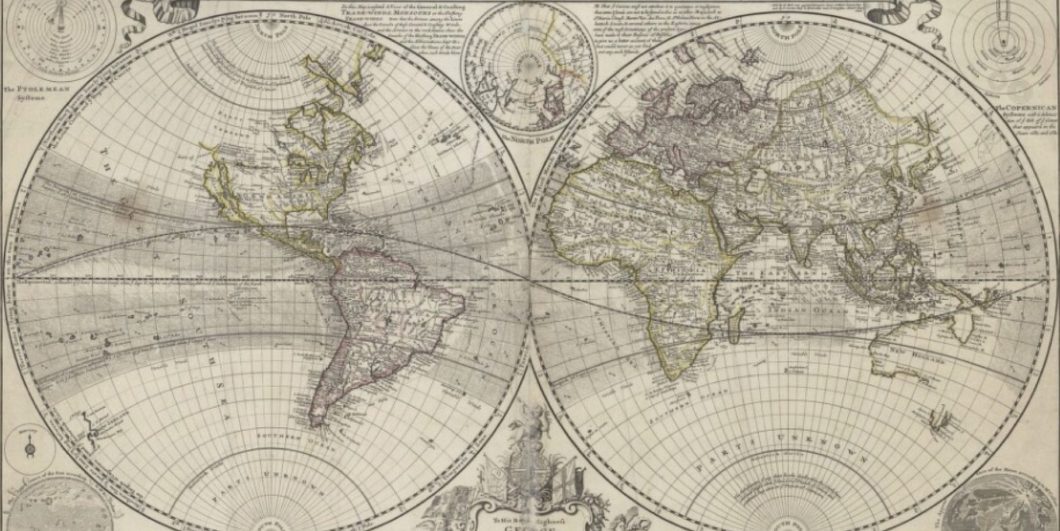Giving Flesh to Democratic Abstractions
Carl Schmitt, the German legal and political philosopher and sometime apologist for Nazism, famously argued that there was no such thing as liberal politics, only a liberal “critique of politics.” One does not have to agree with Schmitt’s irresponsible and extremist reduction of politics to the most radical enmity between friend and enemy to recognize a significant element of truth in his assertion. The founding heuristic device of modern political philosophy, the “state of nature,” posits an original condition of humanity shorn of both politics and moral obligations. These imagined humans are not social and political animals, as in classical political philosophy, or creatures of a transcendent and beneficent God, as in the biblical tradition. They are rather free and equal “individuals” without any intrinsic ties or bonds.
As a result, liberal political discourse in the broadest sense of the term (including that of contemporary left-liberals and many conservatives) oscillates aimlessly between the state and the individual, and has difficulty making sense of more natural forms of human belonging. The state rescues disconnected human beings from the “inconveniences” of the state of nature, as John Locke called them, and accumulates power in the process. Liberalism thus enhances both individual rights and state power, often in the name of “emancipating” individuals from traditional limits and constraints. As Trevor Shelley points out in his lucid and welcome book, Globalization and Liberalism, modern political thought as a whole has difficulty articulating, or even acknowledging, the “we” that falls somewhere between the individual and the state, or increasingly even making sense of the political realm that exists “between the particularism of the individual and the universalism of humanity.” The most radical and consistent forms of modern thought aim at what the 20th century Hegelio-Marxist philosopher Alexandre Kojève called the “universal and homogenous state,” where some find globalized bliss and where others more astutely see the threat of unprecedented forms of despotism, hard and soft.
Communism in its Leninist-Stalinist incarnation proffered the universal and homogenous state in the form of murderous and soul-destroying totalitarian despotism. But under the allure of globalization or global unity, of cosmopolitan peace and “the free movement of goods, capital, peoples and services,” the universal and homogenous state has taken on an apparently more benign face, one that promises democratic peace and integrated markets without much or any civic effort. Whether in a threatening or apparently more benign form, those on the Left and Right who advocate the possibility of immediate and “unmediated” access to Humanity neglect “the complex political sphere between the individual and the world.” They thus abstract from the crucial preconditions of human community and self-government. They assume, without sufficient reflection, that individuals are producers and consumers much more than they are citizens. In doing so, the proponents of globalization seemingly vindicate one important aspect of Schmitt’s indictment of liberalism as a profoundly depoliticizing force.
Manent and the Recovery of a Humane Politics
When democratic peoples protest against the arbitrariness inherent in globalization understood as a fated or inevitable process—the “democratic deficit” that is apparent for everyone to see—they are ferociously denounced as “populists” and “nationalists” as if that is sufficient to put an end to discussion. Populism is, of course, a real phenomenon, and it comes in more or less benign forms. But it is above all a defensive reaction, and not a harbinger of a new authoritarianism accompanied by repression and war. Both critics and opponents of the universal and homogenous state too often assume that a defense of the nation as the political form most conducive to responsible human action, and democratic self-government, necessarily entails an ugly form of nationalism or an unthinking form of populism. They confuse a thoughtful defense of territorial democracy and humane national loyalty, the kind provided by Pierre Manent in France, and the late Roger Scruton in England, with a form of “tribal nationalism.” They cannot see that the aforementioned political philosophers defend independent, self-governing political communities as “particular embodiments of universal human nature,” and ways of “putting reasons and actions in common,” to cite an Aristotelian formulation dear to Manent. Shelley rightly points out that to defend the self-governing political community is to recover politics—human agency—against the claim that full-scale globalization, with its accompanying diminution of self-rule, is inevitable, as inevitable as Communism claimed to be in the 20th century. As Tocqueville already noted in a famous chapter near the beginning of Volume II of Democracy in America, this dogmatic denial of moral and political agency is typical of democratic historians and theorists who readily succumb to the “doctrine of fatality.” To reject such fatalism is a necessary first step in the recovery of the political perspective that underlies self-government, rightly understood.
Manent is a critic of the European project in its present form because it enervates the civic souls of democratic men and women, and ignores the “body,” the nation, that gives flesh to the democratic abstraction.
One of the considerable strengths of Shelley’s book is the way it highlights a tradition of modified or qualified liberalism that resists the anti-political temptation. He does so by turning to three great French political thinkers, Montesquieu in the eighteenth century, Tocqueville in the nineteenth, and Pierre Manent in the 20th and 21st centuries. Each in their different ways articulate a “political science” that wrestles prudently and humanely with the enduring tensions between globalization and self-government. Shelley persuasively argues that each of these French thinkers “defends a middle course between radical particularism and radical universalism, by offering the resources to think through how and why the integrity of human communities—in the plural—ought be maintained, so that political opinion and the civic conversation can be rightly oriented in considering, constituting, and circumscribing the ‘we’ of any political community.” They thus meet Schmitt’s challenge, avant la lettre in two cases, defending modern liberty from the temptation to subordinate political liberty to the invisible forces that are said to govern the behavior of human beings.
Manent, in particular, “demonstrates that in politics the universal only manifests itself through a particular form.”His influence is particularly pronounced in this book. Shelley follows Manent in demonstrating that “the drama of modern humanity…oscillates between the affirmation of universality and the affirmation of particularity.” In truth, human beings have no immediate access to the universal, to “man” per se, or to the great abstraction of a semi-deified Humanity. But through free politics, civic dialogue, and conversation, and through the disciplined and complex efforts of philosophy to make sense of our elemental experiences of justice, truth, love, and religion, human beings experience a self-transcendence that has nothing to do with the artificial and deadly charms of the universal and homogenous state. The recovery of a humane political perspective, for both Manent and Shelley, provides the much needed “mediation” that allows human beings to “hold together the diverse aspects of human life, individual as well as social.” As Manent demonstrates in his masterwork Metamorphoses of the City, there are other mediations, such as the Christian Church, and philosophy of a classical type, open to the full range of human experience. But politics remains central, architectonic as Aristotle put it at the beginning of his Ethics, since it truly holds together all the goods of public and private life. It also allows the transpolitical (those things above man) and the subpolitical (those things below man) to find their proper place in the order of things.
Without the “opération” of putting things in common, without a proper political framework for giving scope to human action, human beings cease to be citizens in any meaningful sense, and become passive and indifferent to shared moral and political goals. The author of a seminal book on Tocqueville (Tocqueville and the Nature of Democracy), Manent appreciates the temptation of passivity and apathetic withdrawal from the responsibilities of civic life that Tocqueville famously called “individualism,” a passivity that continues to haunt contemporary democratic life. Manent is a critic of the European project in its present form because it enervates the civic souls of democratic men and women, and ignores the “body,” the nation, that gives flesh to the democratic abstraction. He does not choose the particular at the expense of the universal, as in the spirit of extreme nationalism. Rather, vibrant “political forms”—the ancient city, an empire such as post-Caesarian Rome, the self-governing and sovereign nation-state, the spiritualized political form known as the Church—are powerful instruments for animating “the springs of the human soul.” Manent is a partisan of political forms, of the embodied and circumscribed character of free political life, and not of the polis or ancient city as such. Here he stands at quite a distance from Hannah Arendt whose republicanism could hardly accommodate the private liberties, and the forms of representation, so central to the regime of modern liberty.
Montesquieu, Tocqueville, and Moderate Liberalism
Shelley’s treatments of Montesquieu and Tocqueville are nearly as inspired as his treatment of Manent. He acknowledges that Montesquieu adheres to a modest form of progressivism—in The Spirit of the Laws (1748) he welcomes free commerce and the English constitution, marked by representation and separation of powers, as well he should. He is at home with the particular character of the present “modern” age: dominated by the spirit of commerce which frees men from “prejudices every day.” But while criticizing the vainglory of Alexander the Great and the spirit of conquest and empire that flowed from it, he also lauds the civic virtue, martial courage, and love of country that animated Epaminondas, the Theban hero and liberator of Spartan slaves. Alexander’s virtues were in fact “chimerical,” while Epaminondas’ political virtue and traits of soul “ought to be for all nations and all time.” Montesquieu steers a middle path between the affirmation of doux commerce (undermining or curing modern peoples from brutal Machiavellianism “every day”) and his recognition that “universal monarchy” is ultimately destructive of liberty and human dignity. Heaven, he tells us, “saved” Louis XIV by thwarting his efforts to become the master of Europe.
Shelley demonstrates that the drift toward world government, toward “the universal and homogenous state,” “is no simple extension of liberalism, for there is a liberal tradition that capably and thoughtfully considers, questions, criticizes, and mitigates, as well as endorses, certain aspects of globalization.”
As Shelley notes, Montesquieu clearly affirmed that “a plurality of powers or states, or rulers, in the international realm is better for all—is in accordance with providence even—instead of unifying power under a single rule.” Montesquieu articulates an admirable form of modern prudence that is still open to classical examples and exemplars of human and political excellence. He is, in my view, more “modern” in his core presuppositions than Tocqueville and Manent while still holding on, somewhat equivocally, to a political perspective. Here one might criticize Shelley for assimilating the three political perspectives of Montesquieu, Tocqueville, and Manent rather more than is justified. But he is surely right that compared to the partisans of the universal and homogenous state, they do form a tension-ridden common front, one with more affinities than differences.
Shelley’s treatment of Tocqueville is wise and insightful. He helpfully unpacks some of Tocqueville’s deepest psychological, political, and spiritual insights: the “democratic” temptation to exaggerate the similarity of human beings and thus to give into indiscriminate compassion; the “pantheistic temptation” to deny the differences built into the political world and even the structure of reality itself with the crucial distinction of God and human beings being increasingly effaced in the name of cosmic unity; the aforementioned critique of the “democratic historians” who succumb to historical and sociological determinism and “the doctrine of fatality.” Inspired by Tocqueville’s analysis, Shelley gently mocks individuals who “speak of ‘saving humanity’ when they know not the names of their neighbors and focus not on the welfare of those next door.” With the political scientist James Ceaser, he takes aim at “Globo-Man” whose “chief psychological trait is his utter lack of attachment to any particular society, leaving him instead drawn to humanity as such.” Shelley points out that Tocqueville already saw how pernicious the religion of humanity was, a religion that Manent regularly (and rightly) excoriates.
Trevor Shelley’s elegantly written book succeeds in recovering a noble and humane political perspective within the horizons of modern liberty and modern politics. He demonstrates that the drift toward world government, toward “the universal and homogenous state,” “is no simple extension of liberalism, for there is a liberal tradition that capably and thoughtfully considers, questions, criticizes, and mitigates, as well as endorses, certain aspects of globalization.” This noble tradition of (qualified) political liberalism “contains some of the resources with which to moderate the tension between universalism and particularism.” By combining thoughtful analysis of certain germane texts of political philosophy with attentiveness to the pressing issues of the age, Shelley has enriched the civic conversation in a spirit indebted to his three great inspirations in this worthy book.



